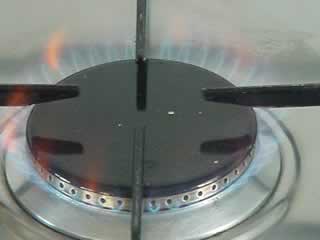Energy changes during chemical reactions are sometimes very obvious. The burning of fuels such as natural gas gives off useful heat energy.
The Law of Conservation of Energy states "energy can not be created or destroyed". So the heat and light energy that comes from the burning of fuels must come from somewhere. The energy is present within the molecules of the reactants in the form of chemical potential energy.
There are two rules that govern chemical and physical changes.
1) The system will try and move to the lowest energy possible, or
2) to the highest randomness (entropy)
The actual end result will be a compromise between maximising entropy and minimising energy.

Energy is released when methane burns in oxygen, a common reaction that occurs in every kitchen.
A few generalization can be made when dealing with energy in chemical reactions.
1) When bonds are formed energy is released (as the system goes to a
more stable configuration)
2) When bonds are broken energy is taken from the surroundings (as energy
is needed to break bonds).